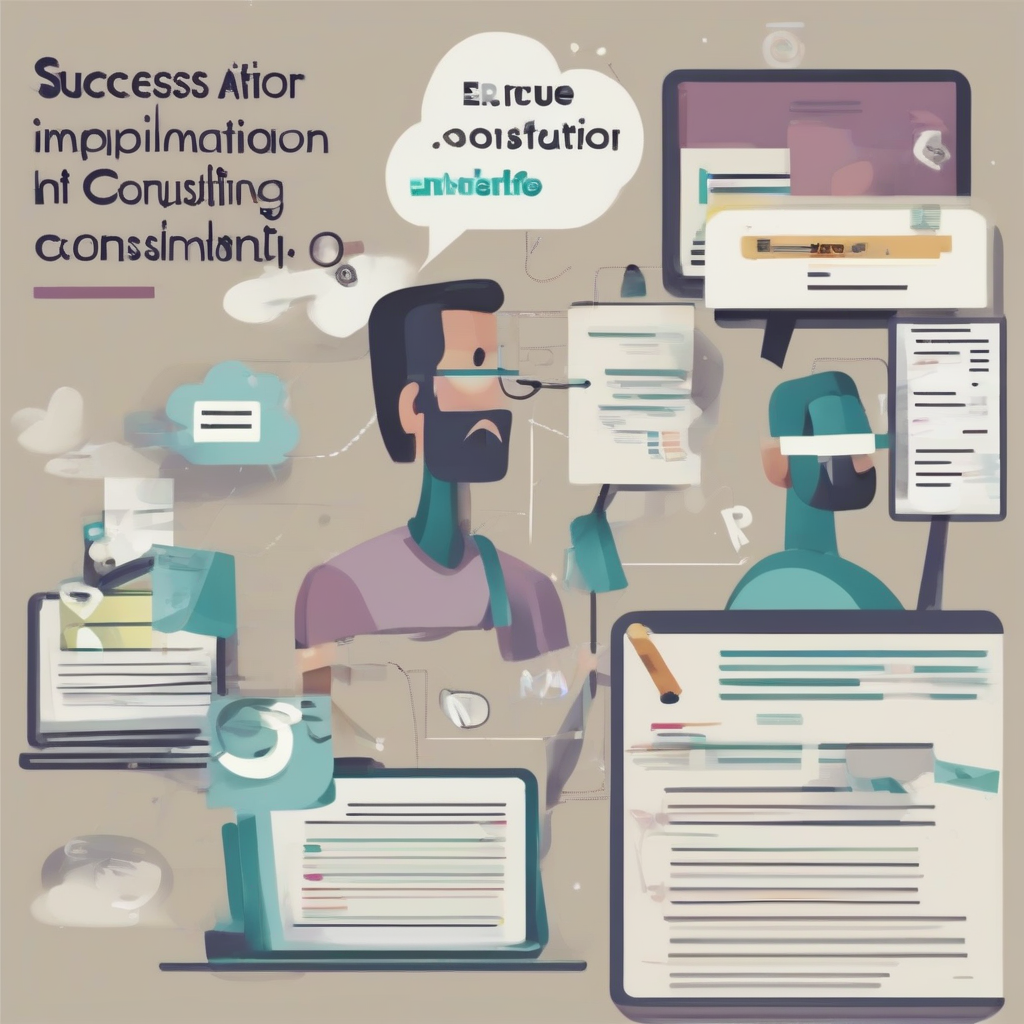ERP Implementation Consulting: A Comprehensive Guide

ERP Implementation Consulting: A Comprehensive Guide
What is ERP Implementation Consulting?
ERP implementation consulting is a specialized service that helps organizations implement and optimize enterprise resource planning (ERP) systems. ERP systems are software applications that integrate various business processes, such as finance, human resources, supply chain, and customer relationship management (CRM). Implementing an ERP system can be a complex and challenging undertaking, requiring expertise in various areas, including project management, business analysis, software configuration, data migration, and change management.
ERP implementation consultants play a crucial role in guiding organizations through this process by providing expert advice, support, and resources. They leverage their deep understanding of ERP software, best practices, and industry trends to help organizations achieve their desired outcomes.
Benefits of ERP Implementation Consulting
- Reduced Implementation Risk: ERP implementation consultants possess extensive experience and knowledge, enabling them to identify potential risks and develop mitigation strategies. This significantly reduces the risk of project delays, budget overruns, and system failures.
- Optimized System Configuration: Consultants tailor ERP systems to meet specific business requirements, ensuring optimal configuration for improved efficiency and effectiveness. This involves customizing workflows, reports, and data structures to align with the organization's unique needs.
- Faster Time to Value: Consultants streamline the implementation process, minimizing delays and accelerating the time it takes for organizations to realize the benefits of their ERP system. This includes efficient project planning, resource allocation, and change management strategies.
- Improved System Adoption: Consultants facilitate user training and adoption, ensuring a smooth transition and maximizing the system's impact. This involves developing clear communication strategies, providing comprehensive user guides, and offering ongoing support.
- Enhanced Business Outcomes: ERP implementation consultants help organizations achieve their strategic objectives by leveraging the system's capabilities for improved operational efficiency, cost savings, data-driven decision making, and enhanced customer satisfaction.
Key Services Offered by ERP Implementation Consultants
- Needs Assessment and Gap Analysis: Consultants analyze the organization's existing business processes and identify areas for improvement. This involves understanding current challenges, data flows, and technology infrastructure to determine the best fit for an ERP solution.
- Solution Selection and Vendor Evaluation: Consultants guide organizations in selecting the most suitable ERP system based on their specific requirements, budget, and industry. This includes assessing various vendor offerings, conducting demos, and evaluating software features and functionalities.
- Project Management and Implementation: Consultants manage the entire implementation process, ensuring adherence to timelines, budgets, and scope. This involves defining project phases, assigning roles and responsibilities, tracking progress, and addressing challenges along the way.
- Data Migration and Integration: Consultants oversee the transfer of data from existing systems to the new ERP platform, ensuring data integrity and accuracy. This involves defining migration strategies, developing data mapping procedures, and validating data quality.
- System Configuration and Customization: Consultants configure the ERP system to meet the organization's specific requirements, customizing workflows, reports, and user interfaces to enhance usability and functionality.
- User Training and Support: Consultants provide comprehensive user training programs to ensure seamless adoption of the new system. This includes hands-on sessions, documentation, and ongoing support to address user queries and challenges.
- Change Management and Communication: Consultants facilitate change management initiatives to ensure a smooth transition for employees. This involves developing communication strategies, addressing concerns, and fostering buy-in from all stakeholders.
- Post-Implementation Support: Consultants provide ongoing support after the system goes live, ensuring system stability, resolving issues, and optimizing performance. This includes regular system monitoring, performance tuning, and user assistance.
Key Considerations for Selecting an ERP Implementation Consultant
- Experience and Expertise: Look for consultants with extensive experience in implementing ERP systems within your industry and with similar business processes. This ensures they possess relevant knowledge and best practices.
- Industry Knowledge: Consultants should understand the unique challenges and regulations faced by your industry. This enables them to tailor the implementation to your specific needs and compliance requirements.
- Project Management Skills: Consultants should have proven track records in managing complex projects on time and within budget. They should also have strong communication and stakeholder management skills.
- Technical Proficiency: Consultants should be proficient in the chosen ERP software and related technologies. This ensures they can effectively configure, customize, and integrate the system.
- Communication and Collaboration: Consultants should be effective communicators who can clearly explain technical concepts and build strong relationships with stakeholders.
- Client References: Seek recommendations from other organizations that have worked with the consultant. This provides valuable insights into their performance and capabilities.
- Cost and Fees: Consider the consultant's pricing structure, including hourly rates, project fees, and any additional expenses. Ensure the fees align with your budget and scope of work.
Conclusion
ERP implementation consulting is an essential investment for organizations seeking to streamline their business processes, improve efficiency, and gain a competitive edge. By engaging expert consultants, organizations can leverage their knowledge, experience, and resources to successfully implement ERP systems, achieving desired outcomes and maximizing their return on investment.
What's Your Reaction?

















